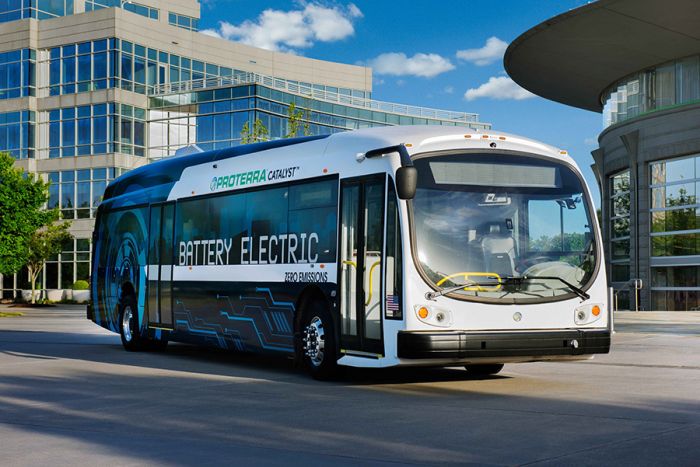La empresa californiana Proterra, que produce actualmente autocares eléctricos de mediano y largo trayectos - con unas autonomías reales de entre 400 y 550 kilómetros - empieza junto con otros socios el estudio de crear autocares autónomos para diferentes trayectos fijos. Aún falta mucho hasta que se vea estos conceptos en la vida real, pero la tecnología avanza a pasos gigantescos.
Proterra ya ha vendido más de 380 unidades de su autobús/autocar eléctrico en los Estados Unidos, donde realizan sus servicios diarios sin problemas.
Veamos aqui el comunicado de prensa integral y en inglés de la empresa californiana:
Proterra, the leading innovator in heavy-duty electric transportation, announced the company is initiating the industry’s first autonomous bus program with the University of Nevada, Reno and its Living Lab Coalition partners that includes the Regional Transportation Commission of Washoe County (RTC), the Nevada Department of Motor Vehicles, the Nevada Governor’s Office for Economic Development, Fraunhofer Institute for Transportation and Infrastructure Systems IVI, and the cities of Reno, Sparks and Carson City, Nev. This program represents Proterra and the partners’ commitment to technology leadership and to establishing safer mobility solutions that will help build public confidence in the safety of eventual autonomous mass transit.
Unlike other programs to date, this autonomous vehicle pilot will deal with real road conditions from the perspective of public transit systems, and emphasize the most challenging aspects related to mass transportation, which include dense and dynamic environments, degraded conditions, and a need for swift emergency response. The pilot will also explore a new set of robotic perception algorithms that are required to address these conditions, and focus on tight cues from multi-modal sensors and new multi-modal localization and mapping. Rather than solely detect traffic, the Living Lab will focus on predicting traffic flows and plans to enhance safety. The University’s current work focuses on the problems of vehicle perception, navigation control, path planning and vehicle-to-vehicle as well as vehicle-to-infrastructure research.
“Autonomy is key for safety, efficiency and reliable transportation systems at scale. Our shared vision is to have robust, long-term autonomy to enable safer modes of transit,” said Carlos Cardillo, PhD Director of the Nevada Center for Applied Research at the University of Nevada, Reno. “In the pilot, we plan to research and develop a robust set of algorithms for localization and mapping, object detection in the domains of multi-modal fusion and recognition of intent to ultimately advance robotic perception and move systems closer to our simultaneous goal of enhancing safety. The project involves University researchers in advanced-autonomous systems, computer sciences, synchronized mobility, robotics and civil engineering.”
The Living Lab program will include three main phases of research and development. Phase 1 focuses on data collection, vehicle instrumentation and intelligent transportation system assessment; Phase 2 on data mining, communications and algorithms development; and Phase 3 on licensing and commercialization. In the first phase, RTC’s state-of-the-art electric bus, manufactured by Proterra, will operate on specific city routes to sense and gather data, which will inform technology and systems development. The pilot is supported by the Knowledge Fund, an innovative funding mechanism developed by the State of Nevada to spur research, knowledge-intensive and innovation-driven economic development, and Research & Innovation at the University of Nevada, Reno.
“As more and more communities take steps to integrate autonomous vehicles, we will continue to advance mobility solutions that best meet those evolving needs, while embracing the highest safety standards on the market,” said Ryan Popple, CEO of Proterra. “We see the Living Lab pilot as a way to support ongoing safety improvements, encourage technology develop in autonomous vehicles, and better understand complex road dynamics.”

08 Mayo 2017
Proterra autobús eléctrico autónomo
por
V. Christian Manz
TagsProterra

